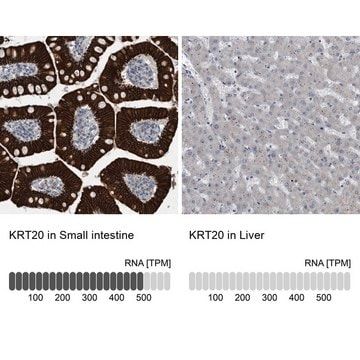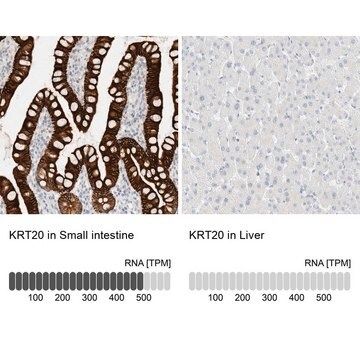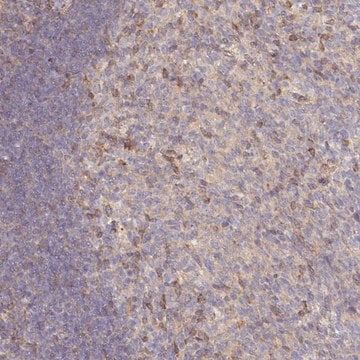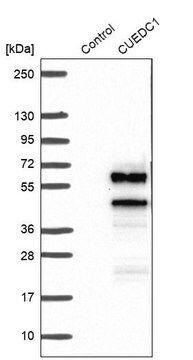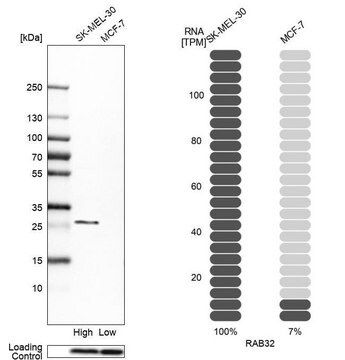ZRB1938
Anti-Cytokeratin-20 Antibody, clone 1E20 ZooMAb® Rabbit Monoclonal
recombinant, expressed in HEK 293 cells
Manufacturer: Sigma Aldrich
Synonym(S): Keratin, type I cytoskeletal 20;CK-20;Keratin-20;K20;Protein IT
Select a Size
| Pack Size | SKU | Availability | Price |
|---|---|---|---|
| 25 μL | ZRB1938-25-μL | In Stock | ₹ 20,810.01 |
| 4 X 25 μL | ZRB1938-4-X-25-μL | In Stock | ₹ 49,479.36 |
ZRB1938 - 25 μL
In Stock
Quantity
1
Base Price: ₹ 20,810.01
GST (18%): ₹ 3,745.802
Total Price: ₹ 24,555.812
biological source
rabbit
Quality Level
200
recombinant
expressed in HEK 293 cells
conjugate
unconjugated
antibody form
purified antibody
antibody product type
primary antibodies
clone
1E20, recombinant monoclonal
description
1E20 Clone
product line
ZooMAb® learn more
form
lyophilized
Description
- General description: We are committed to bringing you greener alternative products, which adhere to one or more of The 12 Principles of Green Chemistry.This antibody is Preservative-free, produced without the harm or sacrifice of animals and exceptionally stable to allow for ambient shipping and storage if needed and thus aligns with "Waste Prevention", "Designing Safer Chemicals" and "Design for Energy Efficiency". Click here for more information.
- Specificity: Clone 1E20 is a ZooMAb® Rabbit recombinant monoclonal antibody that specifically detects Cytokeratin-20. It targets an epitope within 23 amino acids from the C-terminal region.
- Immunogen: KLH-conjugated linear peptide corresponding to 23 amino acids from the C-terminal region of human Cytokeratin-20.
- Application: Quality Control TestingEvaluated by Western Blotting in HT-29 cell lysate.Western Blotting Analysis: A 1:1,000 dilution of this antibody detected Cytokeratin-20 in HT-29 cell lysate.Tested applicationsFlow Cytometry Analysis: 0.1 μg from a representative lot detected Cytokeratin-20 in one million HT-29 cells.Immunohistochemistry (Paraffin) Analysis: A 1:100 dilution from a representative lot detected Cytokeratin-20 in human small intestine tissue sections.Affinity Binding Assay: A representative lot of this antibody bound Cytokeratin-20 peptide with a KD of 6.8 x 10-8 in an affinity binding assay. Immunocytochemistry Analysis: A 1:100 dilution from a representative lot detected Cytokeratin-20 in HT-29 cells.Note: Actual optimal working dilutions must be determined by end user as specimens, and experimental conditions may vary with the end userEvaluated by Western Blotting in HT-29 cell lysate.Western Blotting Analysis: A 1:1,000 dilution of this antibody detected Cytokeratin-20 in HT-29 cell lysate.
- Target description: Keratin, type I cytoskeletal 20 (UniProt: P35900; also known as Cytokeratin-20, CK-20, Keratin-20, K20, Protein IT) is encoded by the KRT20 gene (Gene ID: 54474) in human. Cytokeratin-20 is a heterotetramer of two type I and two type II keratins of the intermediate filament family. It is expressed predominantly in the intestinal epithelium and in luminal cells of colonic mucosa. Its expression is also observed in the Merkel cells of keratinized oral mucosa. It is recognized as a marker of intestinal cell differentiation and is also an excellent marker for certain types of carcinomas, such as adenocarcinomas of the colon, transitional cell carcinomas of the bladder and Merkel cell tumors of the skin. Cytokeratin-20 It plays a significant role in maintaining keratin filament organization in intestinal epithelia and when phosphorylated, it also plays a role in the secretion of mucin in the small intestine. It is reported to undergo hyperphosphorylation at serine 13 during the early stages of apoptosis, which becomes less prominent during the later stages. Phosphorylation at serine 13 is shown to increase in response to stress brought on by cell injury. During apoptosis it is cleaved at Asp 228 by caspases. This ZooMAbZooMAb® recombinant monoclonal antibody, generated by our propriety technology, offers significantly enhanced specificity, affinity, reproducibility, and stability over conventional monoclonals. (Ref.: Moll, R., et al. (1992). Am. J. Pathol. 140(2); 427-447).
- Physical form: Purified recombinant rabbit monoclonal antibody IgG, lyophilized in PBS, 5% Trehalose, normal appearance a coarse or translucent resin. The PBS/trehalose components in the ZooMAb formulation can have the appearance of a semi-solid (bead like gel) after lyophilization. This is a normal phenomenon. Please follow the recommended reconstitution procedure in the data sheet to dissolve the semi-solid, bead-like, gel-appearing material. The resulting antibody solution is completely stable and functional as proven by full functional testing. Contains no biocide or preservatives, such as azide, or any animal by-products. Larger pack sizes provided as multiples of 25 μL.
- Reconstitution: 30 μg/mL after reconstitution at 25 μL per vial. Please refer to guidance on suggested starting dilutions and/or titers per application and sample type.
- Storage and Stability: Recommend storage of lyophilized product at 2-8°C; Before reconstitution, micro-centrifuge vials briefly to spin down material to bottom of the vial; Reconstitute each vial by adding 25 μL of filtered lab grade water or PBS; Reconstituted antibodies can be stored at 2-8°C, or -20°C for long term storage. Avoid repeated freeze-thaws.
- Legal Information: ZooMAb is a registered trademark of Merck KGaA, Darmstadt, Germany
- Disclaimer: Unless otherwise stated in our catalog or other company documentation accompanying the product(s), our products are intended for research use only and are not to be used for any other purpose, which includes but is not limited to, unauthorized commercial uses, in vitro diagnostic uses, ex vivo or in vivo therapeutic uses or any type of consumption or application to humans or animals.
SAFETY INFORMATION
WGK
WGK 1
Flash Point(F)
Not applicable
Flash Point(C)
Not applicable
